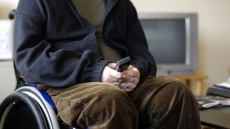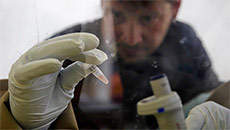University of Minnesota officials are knocking down a tweet claiming its researchers say Ebola is airborne.
University spokeswoman Caroline Marin told the Star Tribune in Minneapolis that the university never made such a claim.
In fact, the tweet refers to a commentary posted a month ago on a university website that was written by Chicago-based researchers who were debating Ebola's "potential to be transmitted" to health workers by aerosolized virus particles, and thus what protective gear they should wear.
World health authorities have been clear that Ebola is transmitted through direct contact with bodily fluids, and that blood, vomit and feces carry the most virus. Health workers are at particular risk because in the course of caring for patients, they draw blood and clean up diarrhea when the patients are most infectious. Likewise in the epidemic zone in West Africa, people involved with burials of highly infectious bodies are at high risk.
What if a sick person's wet sneeze hits your hand and then you absentmindedly rub your eyes? Asked about such scenarios recently, Dr. Tom Frieden, director of the Centers for Disease Control and Prevention, allowed that, theoretically, "it would not be impossible" to catch the virus that way. But it's considered highly unlikely. No such case has been documented.
"Should you be worried you might have gotten it by sitting next to someone?" he said Wednesday. "The answer to that is no."
Frieden said "what actually happens in the real world" — and he cited four decades of dealing with Ebola in Africa — is that the disease is spread through much more direct contact with a sick person.
The World Health Organization says the same thing and notes that few studies have found Ebola in an infected person's saliva, generally in patients who were severely ill.





